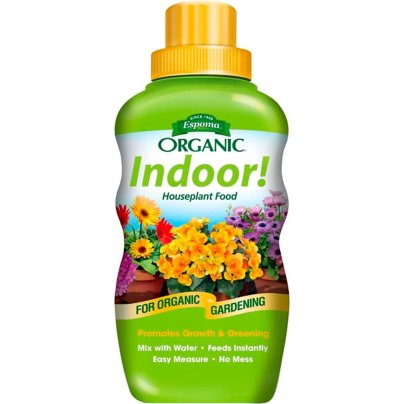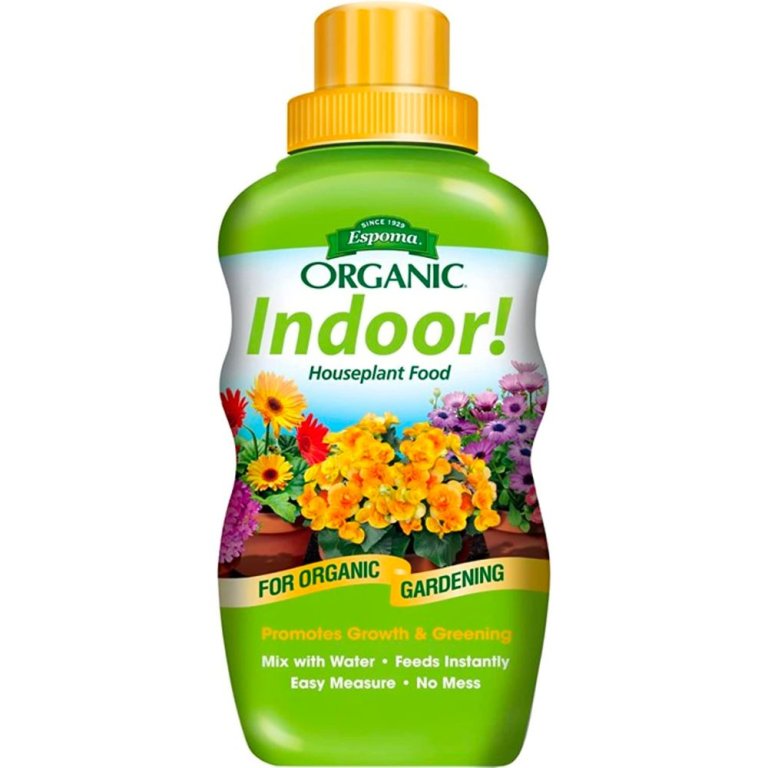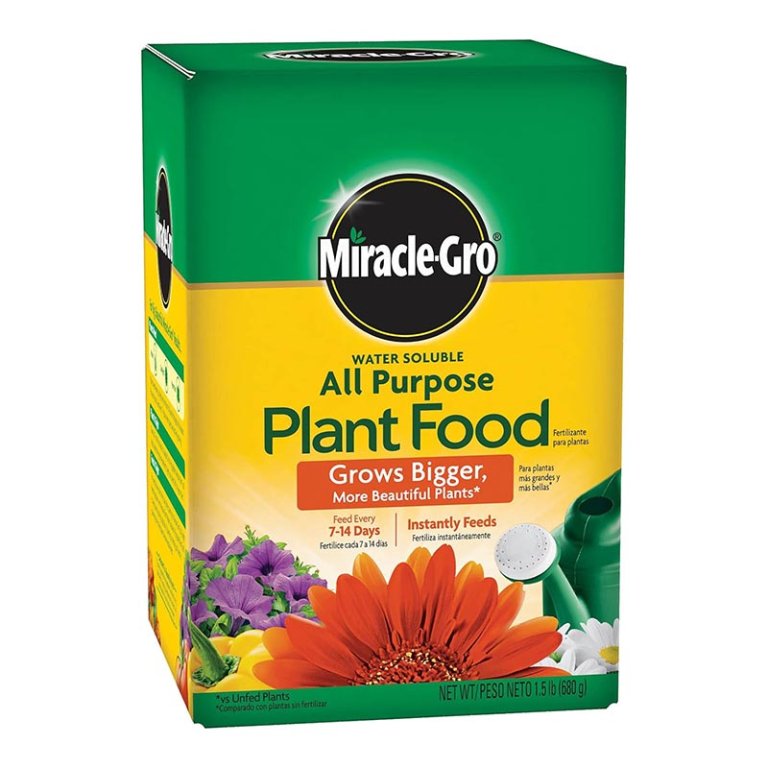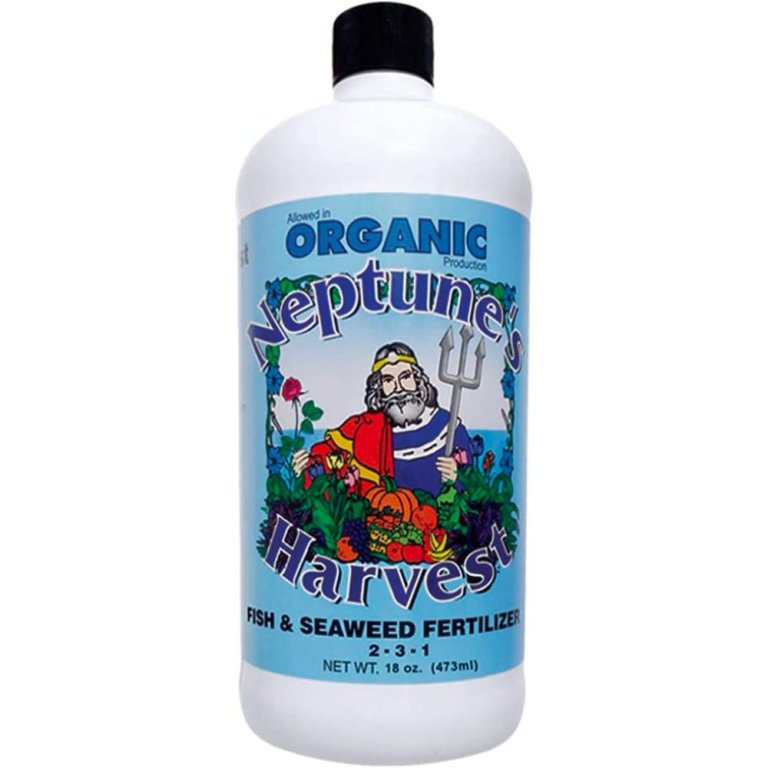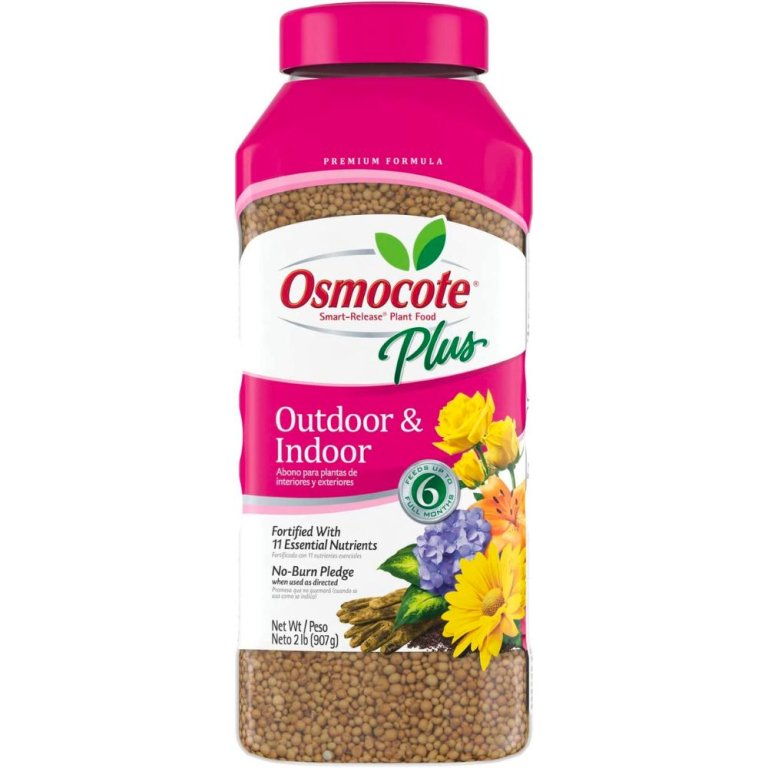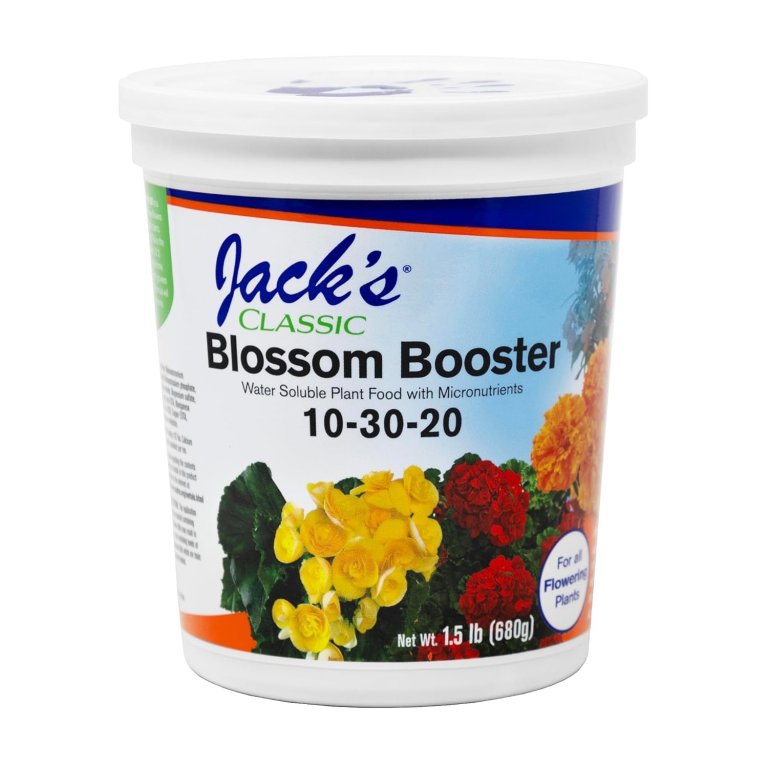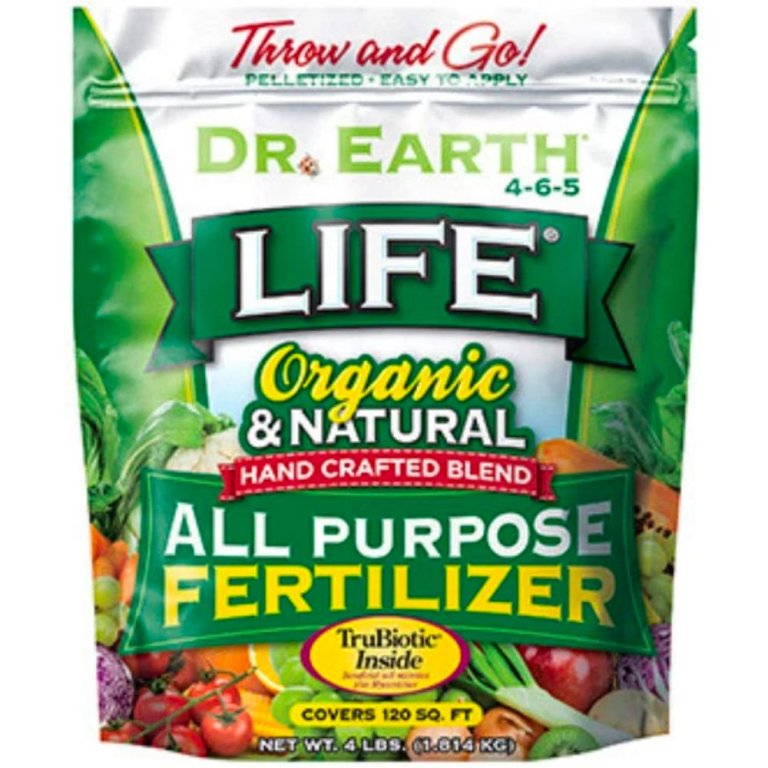
We may earn revenue from the products available on this page and participate in affiliate programs. Learn More ›
Fertilizers for indoor plants provide essential nutrients for houseplants living in containers, helping them stay strong, healthy, and pest-free. After researching dozens of the most popular indoor houseplant fertilizer products, we tested nine top performers for 30 days to learn more about their effectiveness for different plants, soils, and growing environments. We also contacted a landscape expert with more than 30 years of experience to get insights on the benefits of using a houseplant fertilizer.
Based on our research and test results, our top recommendation is the Espoma Organic Indoor Plant Food—a balanced formula that’s easy to apply, effective, and inexpensive. Ahead, follow along with the results of our tests of the best fertilizers for indoor plants before choosing the one that meets your needs.
- BEST OVERALL: Espoma Organic Indoor Plant Food
↓ Jump to Review - BEST BANG FOR THE BUCK: Miracle-Gro Water Soluble All-Purpose Plant Food
↓ Jump to Review - BEST ORGANIC: Neptune’s Harvest Fish and Seaweed Fertilizer
↓ Jump to Review - BEST SLOW-RELEASE: Osmocote Plus Smart-Release Plant Food
↓ Jump to Review - BEST LIQUID: Dyna-Gro SuperThrive Grow 7-9-5 Liquid Plant Food
↓ Jump to Review - BEST FOR CACTUS: Grow More Cactus Juice Cacti & Succulents Fertilizer
↓ Jump to Review - BEST FOR FLOWERING PLANTS: JR Peters Jack’s Classic 10-30-20 Blossom Booster
↓ Jump to Review - BEST FOR HERBS: Dr. Earth Organic Life All Purpose Fertilizer
↓ Jump to Review - BEST ALL-PURPOSE: JR Peters Jack’s Classic 20-20-20 Plant Food
↓ Jump to Review

Fertilizer for Indoor Plants Comparison Chart
| Product Name | Type | Size | NPK |
| Espoma Organic Indoor Plant Food | Organic liquid concentrate | 8 ounces | 2-2-2 |
| Miracle-Gro Water-Soluble All-Purpose Plant Food | Water-soluble granules | 0.5, 3, 5, 5.5, 6.25, and 10 pounds | 24-8-16 |
| Neptune’s Harvest Fish and Seaweed Fertilizer | Liquid | 18 and 36 ounces, 1 and 5 gallons | 2-3-1 |
| Osmocote Plus Smart-Release Plant Food | Slow-release pellets | 1, 2, 4.5, and 8 pounds | 15-9-12 |
| Dyna-Gro SuperThrive Grow 7-9-5 Liquid Plant Food | Water-soluble liquid | 8 and 32 ounces, 1 gallon | 7-9-5 |
| Grow More Cactus Juice Cacti & Succulents Fertilizer | Liquid | 16 ounces | 1-7-6 |
| JR Peters Jack’s Classic 10-30-20 Blossom Booster | Water-soluble granules | 1.5 pounds | 10-30-20 |
| Dr. Earth Organic Life All-Purpose Fertilizer | Slow-release pellets | 1, 4, 12, and 40 pounds | 4-6-5 |
| JR Peters Jack’s Classic 20-20-20 Plant Food | Water-soluble granules | 8 ounces, 1.5, 4, and 10 pounds | 20-20-20 |
Our Top Picks
We tested the best indoor plant fertilizers for a range of specific houseplant needs. If you’re looking for the best plant food for your indoor home garden, check out these reviews.
Best Overall
Espoma Organic Indoor Plant Food
What We Like
- Concentrated formula is easy to mix and apply
- Includes humic acid and beneficial microbes
- Very affordable organic option
What We Don’t Like
- Bottle size isn’t economical for big plant collections
- Requires frequent applications
Specs
- Type Organic liquid concentrate
- Size 8 ounces
- NPK 2-2-2
Our Ratings: Ease of Use 4.5/5; Odor 5/5; Effectiveness 4/5; Value 4.5/5
In our test, the Espoma organic indoor houseplant food proved effective and easy to use. As a concentrated liquid plant food, it requires mixing, which is as simple as filling the cap halfway full (about 2 teaspoons) with fertilizer and the rest of the way with water. Its smell isn’t as pungent as other organic fertilizers we’ve tested and doesn’t linger long after application.
This natural plant food’s ingredients are derived from hydrolyzed poultry manure, hydrolyzed soy protein, hydrolyzed fish protein, bone meal, and kelp extract. It also contains added beneficial microbes proven to enhance nutrient absorption and minimize waste as well as humic acid to regulate soil pH and increase water retention. Even at its regular vs. sale price, this is the most affordable organic houseplant fertilizer we tested in terms of both the purchase price and cost per application. If you have a particularly large collection of indoor plants, however, you may want to wait for a sale as this concentrate only comes in 8-ounce bottles.
Read our full review: Espoma Organic Indoor Plant Food
What our tester says: “This formula is mild and doesn’t deliver fast bursts of growth, but by using in on our plants twice a month, they stay healthy and attractive, with no noticeable insect or disease issues.”—Mark Wolfe, Product Reviews tester and writer
Get the Espoma fertilizer for indoor plants at Amazon, Ace Hardware, Walmart,or Target.
Best Bang for the Buck
Miracle-Gro Water Soluble All-Purpose Plant Food
What We Like
- General purpose formula promotes growth and health
- Works for both houseplants and outdoor garden plants
- Lowest cost per application of all tested products
What We Don’t Like
- Low phosphorus level isn’t ideal for flowering plants
- Highly concentrated formula must be diluted
Specs
- Type Water-soluble granules
- Size 0.5, 3, 5, 5.5, 6.25, and 10 pounds
- NPK 24-8-16
Our Ratings: Ease of Use 4.5/5; Odor 5/5; Effectiveness 4/5; Value 4.5/5
Miracle-Gro has been around for generations, and our test results show why. It’s easy to use and store, produces zero smell, delivers fast results, and is incredibly inexpensive overall and per application. To use these highly concentrated fertilizer granules, simply measure them with the included scoop and mix with water. They will dissolve instantly without clumping or stirring.
Since this product is so concentrated, it’s important to soak the soil when watering but not add so much solution that it runs off. This prevents unused water-soluble nutrients from flowing out of the soil (and perhaps down the drain, depending on your watering process), which can contribute to pollution. Excess nitrogen and phosphorus from private septic systems and municipal sewage treatment facilities can contaminate groundwater and cause unchecked algae growth in streams, lakes, and rivers. To help prevent this, consider capturing and storing any excess water that drains off after fertilization. Use plain water next time your plants need a drink, and then apply the stored runoff during subsequent fertilization.
What our tester says: “Our plants responded really well to us alternating Miracle-Gro applications with plain water during testing. They all sent out a flush of fresh new growth about 2 days after the first treatment and looked healthy and strong by the end of the month.”—Mark Wolfe, Product Reviews tester and writer
Get the Miracle-Gro fertilizer for indoor plants at Amazon, Lowe’s, Ace Hardware, The Home Depot, Walmart,or Miracle-Gro.
Best Organic
Neptune’s Harvest Fish and Seaweed Fertilizer
What We Like
- Minimally processed natural ingredients
- OMRI listed for use in organic gardening
- Concentrated liquid formula is easy to apply
- Generous phosphorus content stimulates root and flower production
What We Don’t Like
- Strong fish smell lingers around for a day
- Doesn’t include measurement tool for mixing
Specs
- Type Liquid
- Size 18 and 36 ounces, 1 and 5 gallons
- NPK 2-3-1
Our Ratings: Ease of Use 4.5/5; Odor 3/5; Effectiveness 4/5; Value 4/5
This organic fertilizer from Neptune’s Harvest is formulated with a combination of fresh fish and seaweed from the North Atlantic. It’s certified by OMRI, so you can rest assured it’s made exclusively with natural and organic ingredients. After watering our test plants with it for a month, the results were excellent: lush new growth and no symptoms of overfertilization or infestation.
To use this concentrated formula, mix it according to the label’s instructions and apply every two weeks. Unfortunately, Neptune’s Harvest doesn’t come with any type of measuring device for this process. While one cap approximates the required tablespoon per gallon of water, the cap isn’t designed for that purpose, which makes it very hard to clean. Still, we had to figure out a way because the dirty cap made the bottle a smelly mess—and the smell is acute, especially in its undiluted state. It is not horrible like rotten fish, but it gives off an intense fish smell that lingers for a day after feeding. Odor aside, the nutrient analysis is just right for stimulating root and bud development, so this could be an excellent choice for cultivating seedlings, reducing transplant shock, and boosting flowering plants. shock, and boosting flowering plants.
Get the Neptune’s Harvest fertilizer for indoor plants at Amazon or Neptune’s Harvest.
Best Slow-Release
Osmocote Plus Smart-Release Plant Food
What We Like
- Continuously feeds for up to 6 months
- Available in 4 different sizes
- Great for indoor and outdoor plants
What We Don’t Like
- Difficult to measure for pots smaller than 6 inches
Specs
- Type Slow-release pellets
- Size 1, 2, 4.5, and 8 pounds
- NPK 15-9-12
Our Ratings: Ease of Use 5/5; Odor 5/5; Effectiveness 4/5; Value 5/5
We anticipated some difficulty gauging the effectiveness of a slow-release fertilizer in just a few weeks, but we were pleasantly surprised. Within a month, our test plants perked up and began showing additional growth. Each had a nice new flush of foliage that looked healthy and strong. The best part was that we didn’t need to mix up fertilizer or follow a weekly or biweekly application—we simply used the included measuring scoop to get the appropriate quantity of fertilizer pellets, pushed them down into the soil’s surface with a small stick, and watered each pot as usual.
Although the purchase price of the Osmocote is slightly higher than some of the other fertilizers we used, the product’s value shines through in the season-long feeding it provides. In fact, on a per-application basis, it’s actually one of the least expensive options we recommend (approximately $.32 per application for 2 gallons of soil). It also eliminates the hassle of mixing solutions and keeping up with a feeding schedule.
Get the Osmocote fertilizer for indoor plants at Amazon, Lowe’s, Ace Hardware,or The Home Depot.
Best Liquid
Dyna-Gro SuperThrive Grow 7-9-5 Liquid Plant Food
What We Like
- Formula is perfect for flowering plants
- Ultraconcentrated liquid is budget friendly
- Can also be used in hydroponics and outdoor gardens
What We Don’t Like
- Difficult to measure accurately in small amounts
Specs
- Type Water-soluble liquid
- Size 8 and 32 ounces, 1 gallon
- NPK 7-9-5
Our Ratings: Ease of Use 4/5; Odor 5/5; Effectiveness 4/5; Value 4/5
The most difficult part of working with the Dyna-Gro fertilizer was measuring the minuscule amount of concentrate needed for a quart of plant food (a quarter of a quarter teaspoon, or .042 ounces). To address this, we mixed up a gallon of fertilizer solution and stored the extra three quarts until needed. Now, each time we apply it, we appreciate that this well-balanced fertilizer provides both micronutrients and a beneficial NPK content, delivering 2 percent calcium along with traces of magnesium, boron, chlorine, cobalt, copper, iron, manganese, molybdenum, sodium, and zinc—all of which are required for long-term plant health.
Our results with Dyna-Gro were similar to those using Osmocote but not as rapid as with Miracle-Gro. The plants produced a healthy flush of new foliage with no symptoms of stress, disease, or insect infestation. This was the only synthetic fertilizer we applied with each watering, so our long-term concern was that residue could accumulate in the soil and cause problems with extended use. When using this product long-term, buyers should monitor their plants for signs of stress and flush the soil with clear water.
Dyna-Gro offers recommendations for different application rates to fit a variety of growing situations. You can feed at each watering with a solution of ¼ or ½ teaspoon per gallon of water or increase the ratio to 1 teaspoon per gallon for a biweekly or monthly feeding schedule. They also provide instructions for use in hydroponic systems, siphon feeders, irrigation injectors, or foliar spray.
Get the Dyna-Gro fertilizer for indoor plants at Amazon or Walmart.
Best for Cactus
Grow More Cactus Juice Cacti & Succulents Fertilizer
What We Like
- Low nitrogen for cacti and succulents
- Value price is great for large cacti collections
- Supports healthy plant tissue and drought resistance
What We Don’t Like
- Must be applied frequently for best results
- For cacti and succulents only
Specs
- Type Liquid
- Size 16 ounces
- NPK 1-7-6
Our Ratings: Ease of Use 4.5/5; Odor 5/5; Effectiveness 4/5; Value 4.5/5
It was much more difficult to gauge our success with Cactus Juice compared to the other fertilizers we tested. The test cacti simply didn’t grow as quickly as other types of houseplants, and we didn’t expect them to. But they looked great and continued to improve throughout the month of testing. The color of the foliage deepened noticeably, and the first hints of flower buds began to appear by the end of the month. In short, everything progressed as it should.
Like most of the other liquid fertilizers we tested, this one did not include a measuring device. Using a measuring spoon to gauge the bottle cap volume, we found that half a capful approximates a teaspoon, so we used it to measure afterward. But then we had to clean it thoroughly before replacing it on the bottle. The tall, narrow 16-ounce bottle itself was easy to handle and poured cleanly.
Get the Grow More fertilizer for indoor plants at Lowe’s or Amazon.
Best for Flowering Plants
JR Peters Jack’s Classic 10-30-20 Blossom Booster
What We Like
- NPK content is perfect for flowering plants
- Also suitable for boosting vegetable and fruit production
- Feeds through both roots and leaves
What We Don’t Like
- Easy to overfertilize if not careful
Specs
- Type Water-soluble granules
- Size 1.5 pounds
- NPK 10-30-20
Our Ratings: Ease of Use 4.5/5; Odor 5/5; Effectiveness 4/5; Value 5/5
We fed Jack’s Classic Blossom Booster to two African violets, two Reiger begonias, and a phalaenopsis orchid. All of these plants had just completed a resting phase when we started the feeding test, and by the end of the month, both the violets and begonias had begun to produce an abundance of new flowers, while the orchid was starting to send up a new flower spike.
This fertilizer comes with its own measuring scoop, and its granules dissolve instantly without clumping. While the 1.5-pound size could be a bit much for those with just one or two indoor plants, its value increases since it’s labeled for use on “all indoor and outdoor flowering plants.” At about $.04 per feeding, this specialty plant food is very cost-effective and produces quality results across a range of different types of flowering plants.
Get the JR Peters Blossom Booster fertilizer for indoor plants at Amazon or JR Peters.
Best for Herbs
Dr. Earth Organic Life All-Purpose Fertilizer
What We Like
- Minimally processed organic ingredients from natural sources
- Suitable for culinary herbs and other edible plants
- Dry formula is easy to apply
What We Don’t Like
- Bulkier and a bit more expensive per application
Specs
- Type Slow-release pellets
- Size 1, 4, 12, and 40 pounds
- NPK 4-6-5
Our Ratings: Ease of Use 5/5; Odor 4/5; Effectiveness 4/5; Value 4/5
This Dr. Earth fertilizer smells mildly like a hayfield, probably due to the high alfalfa meal content, and also contains fish bone meal, fish meal, and kelp meal that (thankfully) does not emit a noticeable fishy smell. It’s easy to apply (although no measuring scoop is included), and because it contains no animal manure, it doesn’t produce any of the “off” smells often associated with organics.
In our trial, we used this Dr. Earth fertilizer for potted plants on potted herbs. As with the Osmocote product, it only required applying it once and watering as necessary. By the end of the month, our plants looked great and had beautiful new flushes of fresh foliage and buds. As much as we like this organic option, it is a bit more costly and bulky than other houseplant food products we tested. The 4-pound bag we used was relatively large and inconvenient for storage, and more product (by volume) is needed per feeding. Also, at $.32 per application, it was the second most expensive fertilizer we tested. However, for shoppers interested in working with nature to improve the soil and grow edible plants with a reduced risk of nutrient runoff, this Dr. Earth product is one of the best houseplant fertilizers available.
Get the Dr. Earth fertilizer for indoor plants at Amazon or Ace Hardware.
Best All-Purpose
JR Peters Jack’s Classic 20-20-20 Plant Food
What We Like
- 20-20-20 formula works for most plant types
- Water-soluble granules are easy to measure, mix, and apply
- Affordable at about $.04 per application
What We Don’t Like
- Careless use may lead to plant damage or nutrient pollution
Specs
- Type Water-soluble granules
- Size 8 ounces, 1.5, 4, and 10 pounds
- NPK 20-20-20
Our Ratings: Ease of Use 4.5/5; Odor 5/5; Effectiveness 4/5; Value 4.5/5
This water-soluble plant food comes in a plastic tub and includes a measuring scoop, making it very easy to store and mix. As with Miracle-Gro and the other JR Peters product we tested, the granules dissolve instantly in water and are easy to sweep up if a few spill. But more importantly, our plants love this fertilizer for the quick burst of nutrients each feeding provides.
After the first application, we noted deep greening of the foliage within 3 days and new bud development within a week. The second application was less like flipping on a light switch and more like nudging a merry-go-round already in motion. Growth continued progressing, culminating in a lush new foliage display by month’s end. Just be careful to mix and apply this product strictly according to the label directions to avoid overfertilizing, waste, and excessive nutrient runoff.
Get the JR Peters 20-20-20 fertilizer for indoor plants at Amazon.
Jump to Our Top Picks
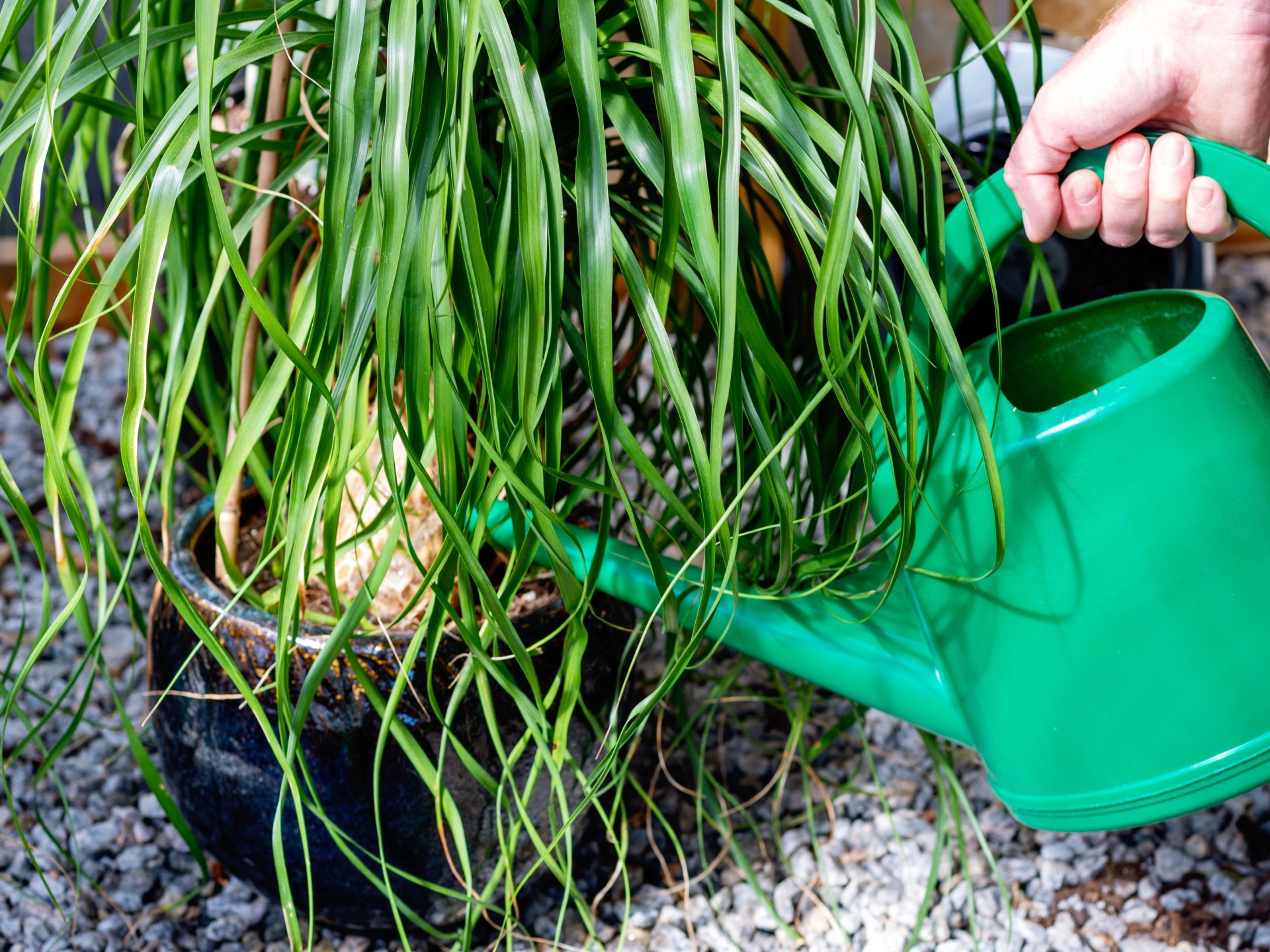
How We Tested the Best Fertilizers for Indoor Plants
Our tests looked at organic and synthetic fertilizers as well as liquid concentrates, water-soluble granules, and dry-application formulas. To obtain comparable results, we set up a trial with nine groups of five houseplants each, all healthy and growing in 6-inch pots. Seven of the groups were made up of common foliage plants like pothos, dracaena, snake plant, and croton, and two specialty groups featured cacti and succulents in addition to flowering houseplants.
We tested these fertilizers from early February through early March, starting as the plants completed a semi-dormant phase. Throughout testing, we monitored them for changes in health and vigor, foliage color, new growth, and infestation by insects or diseases. We also compared the up-front costs of the products along with the application rates, storage, mixing, and user convenience. We recorded our observations, scored each product on a scoring rubric, and gave awards to worthy products based on performance.
| Testing Stats | |
| Products tested | 9 |
| Time spent testing | 4 weeks |
| Tests performed | 4 to 5 |
| Price range | $10 to $20 |
Our Ratings: Fertilizers for Indoor Plants
| Product Name | Ease of Use | Odor | Effectiveness | Value |
| Espoma Organic Indoor Plant Food | 4.5 | 5 | 4 | 4.5 |
| Miracle-Gro Water-Soluble All-Purpose Plant Food | 4.5 | 5 | 4 | 4.5 |
| Neptune’s Harvest Fish and Seaweed Fertilizer | 4.5 | 3 | 4 | 4 |
| Osmocote Plus Smart-Release Plant Food | 5 | 5 | 4 | 5 |
| Dyna-Gro SuperThrive Grow 7-9-5 Liquid Plant Food | 4 | 5 | 4 | 4 |
| Grow More Cactus Juice Cacti & Succulents Fertilizer | 4.5 | 5 | 4 | 4.5 |
| JR Peters Jack’s Classic 10-30-20 Blossom Booster | 4.5 | 5 | 4 | 5 |
| Dr. Earth Organic Life All-Purpose Fertilizer | 5 | 4 | 4 | 4 |
| JR Peters Jack’s Classic 20-20-20 Plant Food | 4.5 | 5 | 4 | 4.5 |
What to Consider When Choosing a Fertilizer for Indoor Plants
While it’s easy to assume that all indoor plant fertilizers offer similar performance, several factors affect their functionality. Keep reading to learn about several of the most important features to consider when choosing the best fertilizer for indoor plants.
Types of Fertilizers for Indoor Plants
The three primary types of fertilizer are liquid, granular, and slow-release pellets. Each kind has advantages and disadvantages.
Liquid
Before applying it to a plant’s leaves or soil, liquid fertilizers for plants must be mixed with water, which requires some additional measuring. However, the water makes liquid plant foods easier to apply sparingly and avoid overfertilization. Liquid houseplant fertilizer and food are typically best for those with many houseplants because a large amount of water must be used to dilute very little fertilizer. However, liquid indoor plant fertilizers move through soil and plant systems rapidly and must be applied frequently—every 1 to 2 weeks.
Granular
Granular fertilizers are affordable and effective. Simply sprinkle the fertilizer on top of the soil, then mix or water it in. Synthetic fertilizer granules gradually dissolve as the plant is watered, typically within about 30 days. Organic plant food nutrients are released by soil microbial activity, also within about a month. Use a granular houseplant fertilizer when initially planting or repotting a plant so it can be thoroughly mixed into the soil. It typically must be reapplied after 4 to 6 weeks.
Slow Release
Slow-release indoor plant fertilizers come in several formats, including pellets, spikes, pods, and capsules. Because they emit nutrients gradually, they can last 3 to 6 months. They’re typically only available in traditional—not organic—formulas.
NPK Ratio and Plant Species
The best fertilizers contain a mixture of macronutrients—nitrogen (N), phosphorus (P), and potassium (K)—along with traces of micronutrients. The balance of these three macronutrients is represented by its NPK guaranteed analysis, which is listed on the fertilizer’s packaging.
For example, a guaranteed analysis of 10-10-10 means that 10 percent of the fertilizer, by weight, is nitrogen; 10 percent is phosphorus; and 10 percent is potassium. The remaining 70 percent can be made up of any combination of micronutrients and inert ingredients. Explicit details are shown on the back of the houseplant fertilizer label.
The guaranteed analysis is sometimes converted to an NPK ratio. For instance, 10-10-10 fertilizer has a ratio of 1-1-1, whereas 10-30-20 fertilizer has an NPK ratio of 1-3-2. The NPK ratio is a good way to compare different brands and formulations of fertilizers. Three different fertilizers may have three different analyses, for example, 5-5-5, 10-10-10, and 20-20-20, but the same 1-1-1 NPK ratio. This comparison could indicate that the products may work for the same plant types, using different application rates.
Because each plant species has different nutritional needs, a “perfect” NPK ratio doesn’t exist. Generally, green houseplants require a balanced NPK ratio or one that’s slightly higher in nitrogen. A higher balance of phosphorus is particularly beneficial for flowering plants such as African violets, oxalis, and peace lilies. Phosphorus also aids in fruit production, making it beneficial to edible plants like citrus trees and tomatoes. Potassium is closely linked to general plant health, healthy cellular structure, and drought resistance.
Organic or Traditional
One of the primary decisions shoppers must make is choosing between a traditional or an organic fertilizer.
- Organic fertilizers are made entirely from minimally processed natural ingredients. Although organic fertilizers are free of potentially harmful chemicals and synthetics, their nutrient values aren’t as concentrated as traditional products. Moreover, over time, their natural content can emit an unpleasant odor. Since the marketing term “natural” isn’t regulated particularly well in fertilizers, look for a product approved for certified organic use by the OMRI.
- Traditional or synthetic fertilizers contain a balanced blend of minerals for feeding houseplants. They typically cost less than organic fertilizers and come in more concentrated formulas.
Application
A fertilizer’s ease of application depends largely on whether it’s a liquid, granular, or slow-release formula.
- Liquid fertilizers must be diluted with water according to the manufacturer’s instructions. Pour liquid fertilizers onto the plant’s soil, or if directed by the manufacturer’s instructions, some liquid fertilizers may be absorbed through plant foliage.
- Granular fertilizers can be sprinkled evenly on the soil’s surface and mixed into the top 3 inches of soil before it’s watered, which releases the nutrients.
- Slow-release fertilizers vary in application method. Follow the manufacturer’s instructions for fertilizing with pods, spikes, pellets, or capsules.
Tips for Using the Best Fertilizer for Indoor Plants
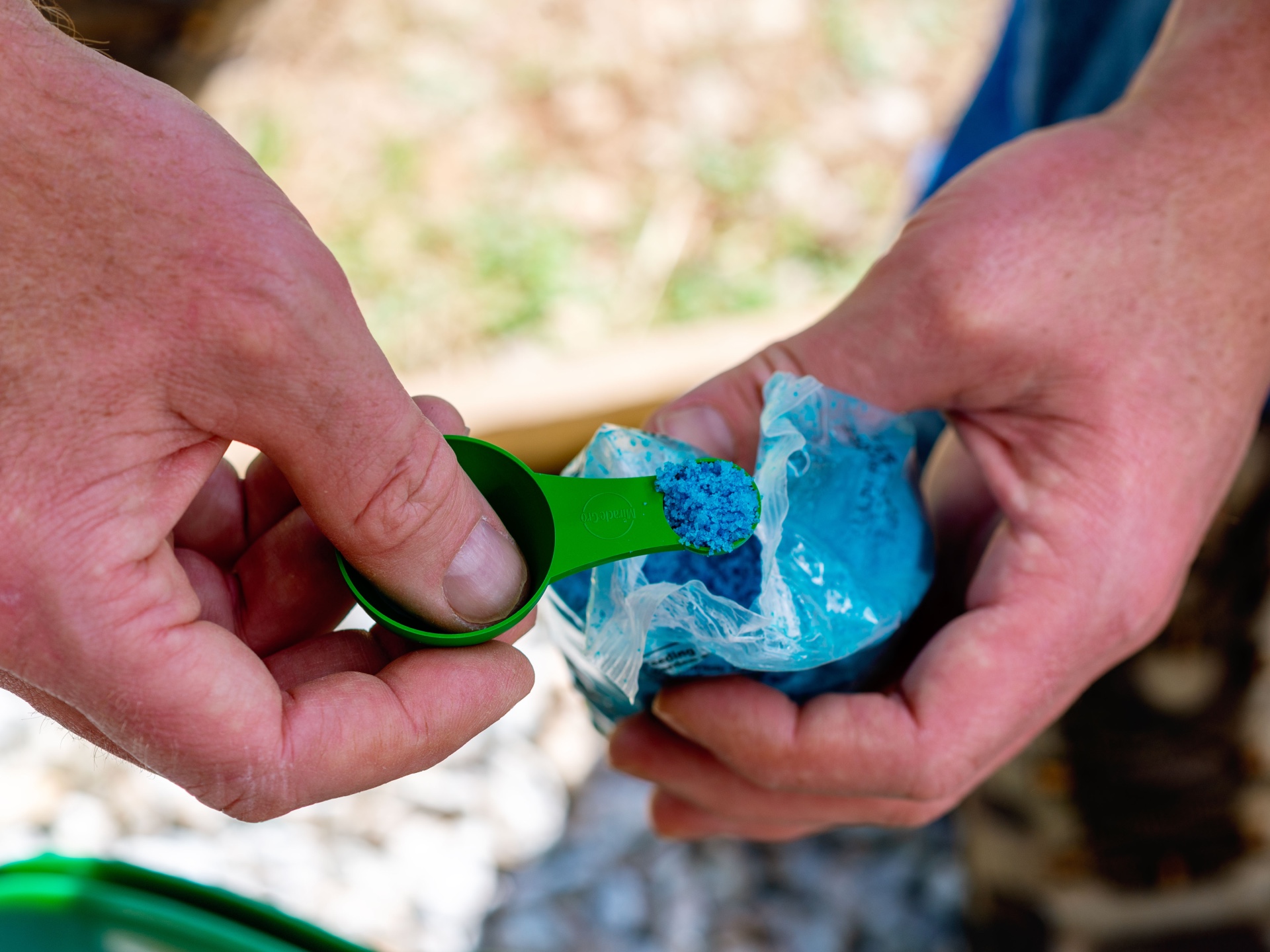
To know how to fertilize plants without risking overfertilization or other fertilizer mistakes most home gardeners make, follow these tips:
- Since all fertilizers are different, follow the instructions on the manufacturer’s label.
- Avoid over-fertilization. Reduce your fertilizing schedule if your plant’s leaves droop or begin to look burnt at the edges.
- Avoid fertilizing plants that are stressed by drought, disease, or insect infestation. Treat the problem first, then fertilize after the plant recovers.
- Know how to recognize nutritional deficiency based on leaf color: According to Ward Dilmore, founder and head landscape designer at Petrus Landscaping, “brow leaves can be a sign of a lack of potassium,” and “yellow leaves are a very common sign of a lack of nitrogen.” Purple leaves often indicate the plant needs more phosphorus.
- There’s no need to fertilize most houseplants during their dormant season if you live in an area that experiences standard seasonal temperature changes.
- If you’re still experiencing issues, use a soil test kit to check the soil’s nutrient levels and adjust fertilizer application as appropriate.
FAQs
While you now know more about choosing the best fertilizers for indoor plants, you might still want more information about how to use them. Here are some answers to some of the most frequently asked questions about the proper fertilization of plants.
Houseplants have been removed from their natural habitat and therefore lack the macronutrients and micronutrients present in their native soil that help them remain healthy. Good fertilizer for houseplants supplements these nutrients.
Houseplant fertilizers contain a mixture of macronutrients (nitrogen, phosphorus, and potassium) and micronutrients that supplement the nutrients already in the plant’s soil. These ingredients can come from a variety of sources. In fact, you can make homemade plant food with a few everyday household products.
The fertilization method depends on the chosen formula. Add powder and granular fertilizers to the plant’s soil, and then water. Dilute liquid fertilizers with water before application.
The ideal fertilization schedule depends on the type of fertilizer you choose. Liquid fertilizer should be applied every 2 to 4 weeks, whereas a granular fertilizer only needs to be applied every 4 to 6 weeks. Fertilize with a slow-release formula every 3 to 6 months.
Overfertilization is a common problem with houseplants. The signs of overfertilization vary depending on the plant species, but they include symptoms like wilting, burnt leaves, and dried leaf margins.
When asked about fertilizer application, landscape expert Ward Dilmore said, “During the spring and summer, most indoor plants benefit from monthly fertilizing. In fall and winter, when plants enter dormancy it’s best not to fertilize at all as it will allow the plants to go into dormancy without it pushing out new growth.” Start fertilizing your houseplants in early spring, about 8 weeks before the last expected frost. In areas that don’t experience winter frosts, reduce applications to half strength.
Meet the Tester
Mark Wolfe is a writer and product tester with a background in the nursery and landscaping industry. For more than 20 years, he mowed, edged, planted, pruned, cultivated, irrigated, and renovated beautiful landscapes. Now he tests and writes reviews about the latest outdoor power equipment, hand tools, lawn-care products, and other outdoor-living goods.
Additional research provided by Savannah Sher.
